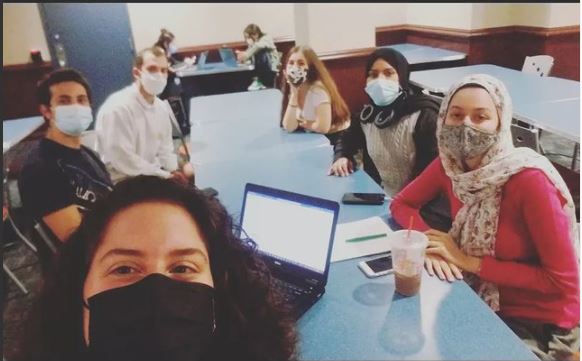‘Speakers of all levels’: Pitt language clubs connect students

Image courtesy of Tamara Alchoufete
Pitt’s Arabic Language and Culture club.
November 18, 2021
Being Lebanese, Tamara Alchoufete, president of the Arabic Language and Culture Club, grew up speaking and understanding Arabic. She said she has been a member of the club since her first year, when she joined to connect with other students who spoke Arabic.
“When I came to Pitt, I decided to study Arabic and learn how to read and write to complete my fluency,” Alchoufete, a senior anthropology major pursuing an Arabic certificate, said. “The Arabic Club was a place where I could connect with other students also interested in Arabic.”
While Pitt offers classes in 35 different languages, language clubs offer students opportunities to practice their conversation skills outside of the classroom. Students can also participate in activities, such as collaborations with different clubs and cultural events. Members of these clubs range from native speakers to those with no prior experience with the languages.
Benjamin Hudock, president of the Spanish Club, has also been a member of the club since his first year. Despite not officially studying Spanish at Pitt, he said he still enjoys pursuing classes, such as a Latin American music class, with Spanish language content.
“When I got to Pitt, I got a placement test and started taking upper-level Spanish classes,” Hudock, a senior chemical engineering major, said. “I thought I was going to do a minor … but I decided against it. Next semester I’m going to take a Latin American music class, which is going to have heavy Spanish language content and is also about music, which I love.”
Hudock said he is looking forward to an upcoming collaboration between the Spanish Club and Brazil Nuts — a Brazilian culture and Portuguese language club — where members will be doing fill-in-the-lyrics and word games.
The Spanish Club meets biweekly for conversation tables which they call “mesas,” meaning “tables” in Spanish. They also host film screenings and cultural events. Recently, the club had two events for Día de los Muertos, or the Day of the Dead. They made origami skulls one week and made “papel picado,” which are colorful paper decorations, another week.
Due to COVID-19 restrictions last year, language clubs had to adapt their activities. While most events for the language clubs have resumed, some are still on pause. For instance, the Spanish Club still cannot hold cooking events, according to Hudock.
“One of the things that I loved my freshman year — and I’m so sad it’s still missing right now — is events having to do with cooking and getting people together in the kitchen,” Hudock said. “The Center for Latin American Studies actually has a kitchen space that you used to be able to reserve. I looked and this semester you no longer can.”
The Turkish Language Table accommodated students by doing virtual walk-throughs through the streets of Istanbul last year due to COVID-19 restrictions, according to club president Eric Workman. Workman said the Turkish Language Table meets once or twice a month, and has about 20 to 30 members, ranging from native Turkish speakers to those with no prior Turkish knowledge.
“We usually share Turkish tea and Turkish coffee while listening to Turkish music, watching Turkish movies or playing traditional Turkish games,” Workman, a senior philosophy and economics major with linguistics and Turkish minors, said.
While hosting conversation tables biweekly, The Arabic Language and Culture Club also has general body meetings, provides extra credit opportunities to those in Arabic courses and collaborates with various clubs on events related to Arabic language and culture. Alchoufete said these collaborative events are her favorite part of the Arabic club.
“It continuously shows me how powerful language can be and how unifying it is to be learning a language in a community with others sharing similar struggles and successes,” Alchoufete said.
While many members of the language clubs are either native speakers or pursuing degrees in the respective languages, Alchoufete said that the Arabic Language and Culture Club is welcome to all of those wishing to learn Arabic.
“You don’t need to be pursuing a certificate or major to study a language,” Alchoufete said. “If the Arabic club has taught me anything, it is that language becomes a habit when we engage in it actively and socially. Want to learn Arabic? Join the club.”
Alchoufete is a former staff writer at The Pitt News.







